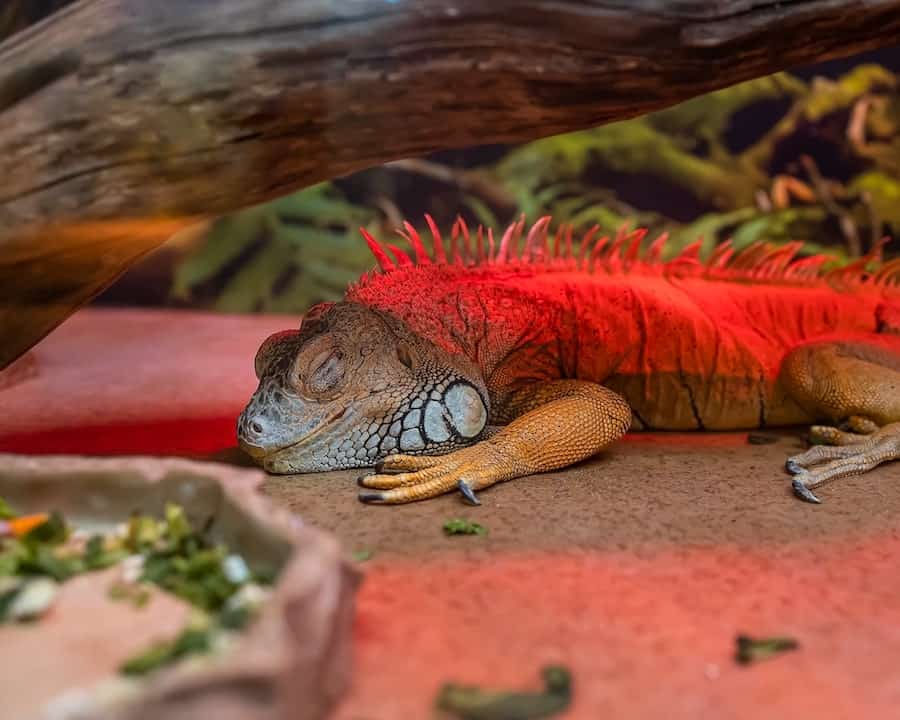Is your iguana stressed, or are you worried that your reptile may be unhappy in its habitat? Iguanas can become stressed for a variety of reasons, and they often show signs of discomfort.
Understanding the signs of stress and what to do about it can help you take better care of your iguana.
1. A Stressed Iguana Changes Color

Unlike chameleons, which can change color to camouflage with their surroundings, iguanas only change color when their environment changes, they are sick or they are stressed.
When iguanas are stressed, they tend to turn a darker color. Some iguanas turn black from stress or develop dark-colored stripes.
Curious about iguanas and their color changing capabilities? Check out this post I wrote titled, “Do Iguanas Change Color & Why?”
2. A Stressed Iguana May Lose Its Appetite

Have you ever felt so stressed that the thought of eating anything made you sick to your stomach? Iguanas can respond to stress in the same way.
Iguanas are very sensitive to changes in their environment. Even minor changes can stress out your iguana and make them lose its appetite.
But major changes, like moving your iguana to a new cage or home, can really make your iguana uncomfortable and uninterested in eating.
3. A Stressed Iguana May Close Its Eyes

Some iguanas close their eyes when they feel stressed, especially if they are being handled and aren’t used to it.
Closing their eyes helps shut off sensory input, making it easier to cope with stressful situations.
It’s important to note, however, that iguanas also close their eyes when they sleep and when they feel relaxed and comfortable in their environment.
Your iguana’s posture and behavior can give you some clues as to whether their closed eyes are caused by stress or bliss.
Did you know iguanas have 3 eyes?! Read about it in this post I wrote called, “Do Iguanas Have 3 Eyes? Everything You Need to Know.”
4. A Stressed Iguana May Try to Hide
According to James Hatfield, iguana expert and author of “Green Iguana The Ultimate Owner’s Manual,” an iguana that hides frequently or for too long is an unhappy lizard.
Symptoms can include:
- Hiding under the substrate in its habitat
- Spending most of the day in its hide box
- Keeping its head in the corner of its habitat
It’s common for iguanas to hide if they are just brought home or moved into a new cage. Eventually, they adapt to their new environment and emerge from hiding.
But if your iguana is hiding too often or for too long, it may be a sign of stress.
5. A Stressed Iguana May Become Aggressive
Just like humans and other animals, iguanas can become aggressive when they’re stressed out. They become more defensive to protect themselves against potential threats or whatever is making them uncomfortable.
Iguanas can easily become stressed and more aggressive because of changes in their environment, new visitors, pets, and even certain objects.
Learning to recognize the signs of an aggressive iguana can mean the difference between a trip to the hospital or safely avoiding the injury in the first place. Hence, check out this post I wrote titled, “7 Signs An Iguana is Mad: Ignore at Your Peril.”
6. A Stressed Iguana May Poop Irregularly or in Irregular Spots

Iguanas love routines. They prefer to eat, poop and sleep at the same time and in the same places every day.
If your iguana is pooping irregularly (e.g., defecating more often than usual or at different times of the day) or in unusual spots, this may be a sign of stress.
7. A Stressed Iguana May Become Lethargic

Stress can be exhausting for any creature, and that includes iguanas. When iguanas are stressed out, they may be more lethargic than usual.
Some iguanas get so stressed out that their bodies seem to shut down and it seems almost as if they are going into hibernation mode.
An unusually lethargic iguana is not a happy one, and this may be a sign of stress.
8. A Stressed Iguana May Bob Its Head

Iguanas bob their heads for many reasons – including to say “hi” – but quick bobbing may be a sign of stress.
If your iguana feels threatened, it may bob its head, extend its dewlap and even wag its tails.
9. A Stressed Iguana May “Wag” Its Tail
A stressed iguana just wants to be left alone until it feels safe and secure in its environment again. One way they may tell you they’re stressed is by “wagging” their tails.
The “wagging” is more like a whipping action. Tail whipping is a sign that your iguana is seriously stressed and a warning to back off.
10. A Stressed Iguana May Try to Escape Its Cage

Stress can trigger a fight or flight response in iguanas, which can cause them to run away or even try to escape their cages.
If you’ve just brought your iguana home or changed its cage, it may try to escape its new habitat out of fear.
11. A Stressed Iguana May Constantly Dig

Iguanas may dig for a variety of reasons, but stress is a common one. Digging can also be a sign of aggression.
Iguanas that refuse to accept their habitats and don’t feel secure in their new homes may dig because they’re unhappy.
12. A Stressed Iguana May Bathe Longer Than Usual

Bathing is a beneficial activity for iguanas. It helps with hydration (which is important for kidney health), and it also helps with shedding.
Many iguanas enjoy a good bath, but if they’re bathing longer than usual, this may be a sign that they’re stressed out.
13. Stressed Iguanas May Spend a Longer Time in The Cooler or Warmer Side of The Cage

When iguanas are stressed, they may become more lethargic. As a result, they may spend more time on the basking side or the cooler side of their habitat.
Many iguanas will seek out cold, tight, and dark places when they feel stressed.
If your iguana is spending more time than usual in either of these spots, it may be a sign of stress.
14. A Stressed Iguana May Shed Irregularly

As a baby, iguanas will shed every 4 – 6 weeks. Adults shed once – maybe twice – per year in rare cases. Stress can impact an iguana’s shedding cycles, causing them to become irregular.
15. A Stressed Iguana May Have Trouble Sleeping

Some iguanas have trouble sleeping when they’re stressed. You should do your best to keep the enclosure at a comfortable temperature and clean it often.
Why Do Iguanas Get Stressed?

Do you have a stressed iguana? The following are a few reasons why they may be stressed:
The Cage is Too Small
Iguanas need the “perfect-sized” cage for them to be happy. If your cage is too small or big, it can cause them stress.
The ideal size for a cage is:
- 1.5 feet longer than the reptile
- 6 – 8 feet in height
- 4 – 6 feet in depth
As an adult, the cage length should be around 8 feet. However, for a hatchling, you’ll be fine with a smaller cage.
The Iguana is New in Your Home
New places and spaces are intimidating and will take time for your iguana to feel comfortable in. Do your best to make your pet as relaxed as possible.
New Person
Just like a new home can make your reptile feel uncomfortable and stressed, a new person will do the same. Time is the only remedy for this stressor.
Lack of Routine
Reptiles like routine, too. You should allow them to do the following around the same time every day:
- Eat
- Sleep
- Come out
Changing routines can cause your iguana stress.
Other Animals in The House
Cats, dogs, and other pets can make an iguana uncomfortable. After all, your reptile is in a cage with very little room to escape. Over time, this stress may subside.
Other Iguanas in the Cage
Rivalry is a real issue with iguanas, especially during mating season. Even another iguana of the opposite sex can cause your pet to be stressed. If you foresee wanting more than one iguana, try getting both around the same time.
Mating Season

During mating season, it’s best to keep other pets away from your iguana because they can go through mood swings and become very stressed.
Constant Loud Noise
Loud noises can startle your iguana and cause them to exhibit some interesting behavior. Some owners report even doorbells stressing their pets out.
You should try to limit loud noises to the best of your ability.
If you want to make your iguana happy or see them tilt their heads, you can add nature sounds to the space. They seem to really like the sounds of frogs – just keep sound levels low.
Unsanitary Cage Conditions
What is the living condition of your iguana? If the cage is a mess, you need to clean it. Regular cage cleaning and ensuring that your iguana lives in sanitary conditions can eliminate stress and make them happy.
Improper Temperature
Iguanas demand high radiant temperatures. You need to have an enclosure with the following:
- 76°F – 85° F
- 95° F – 100° F basking area
You never want the environment to fall below 76°F for an adult. Instead, we recommend staying within a temp range of 80°F to 85°F.
Bright Lights
Iguanas get scared easily, and they may not like certain colors or bright lights. Even if a person with a certain color shirt walks into the room, they may become stressed.
You want to be mindful of bright colors, especially:
- Yellow
- Purple
Monitor your reptile’s response to new colored lighting, objects and items that you wear.
What to do If Your Iguana is Stressed?

Managing your iguana’s stress is possible, but you need to make an effort to:
- Identify the stressor
- Find ways to reduce the stressor
Using the reasons why iguanas get stressed from above, it’s easy to create a checklist of things that you can do to reduce stress:
- Allow the reptile time to get accustomed to your home and new people
- Purchase a larger cage
- Create a routine for your iguana to follow
- Find ways to limit loud noises
- Keep the cage clean and at the right temperature
- Reduce the number of bright lights or find ways to limit exposure
- Place the iguana in its own cage
If you notice that your iguana shows signs of stress when your cat or dog comes into the room, try to create a barrier to limit this stressor.
Owners should work to find ways to eliminate stress in their iguanas’ lives as much as possible. If you allow the reptile to stay in a state of stress for long periods of time, it can have severe, long-term consequences.
Long-Term Effects of a Chronically Stressed Iguana

Chronic stress is not good for your iguana. The long-term effects of stress can include:
Immune System Damage
Long-term stress can lead to the iguana’s immune system working less effectively. A weak immune system can cause faster development of:
- Infections
- Parasites
General Weakness
Many owners note that their iguana shows signs of general weakness when they experience chronic stress. The main reason behind this weakness and lethargy has to do with energy.
Stress hormones will cause iguanas to use more energy than normal.
Over the long-term, the lack of energy will cause even a formerly energetic iguana to show signs of weakness and lethargy.
Weight Loss and Dehydration
Stress can also lead to a loss of appetite and drinking less water. When the two are combined, the reptile will begin to lose weight and show signs of dehydration.
Can Iguanas Die From Stress?

Stress is a killer. An interesting study from 2010 followed 98 iguanas after an El Nino. The iguanas in the study started to release corticosterone when they were experiencing stress.
The hormone helps iguanas use their protein reserves. However, the hormone can help these reptiles react to their situations better, such as moving faster when they’re being attacked by a predator.
In the short-term, corticosterone helps a stressed iguana.
However, in the long-term, this stress hormone proved to be fatal to iguanas who couldn’t turn it off. The hormone leads to excess energy expenditure and death.

